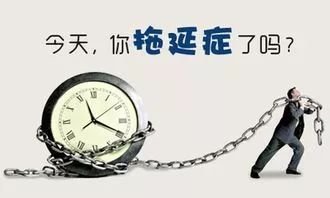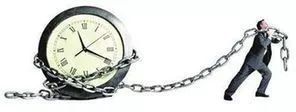拖延症(英文:Procrastination)指的是非必要、后果有害的推迟行为。“拖延”不仅会使我们的生活杂乱无章,还会严重影响到我们的心情,跟小译一起来看看如何用“一分钟法则”拒绝拖延吧!

Imagine this scenario: You come home from work, throw your jacket on a chair and toss your unopened mail on the kitchen counter. After dinner you deposit your plate and glass in the sink to clean later and dump a pile of dirty clothes on the laundry room floor to wash when you can. A friend texts and you make a mental note to respond after you relax a bit.
想象一下这样的场景:你下班回家,把外套扔在椅子上,把还未看的邮件扔到厨房的柜台上。吃完晚饭后你把盘子和杯子堆到水槽里,把一堆脏衣服倒在洗衣房的地板上,想着休息一会儿再清洗。朋友发来短信,你在心里提醒自己休息一会儿就回复。

It's easy to put off small chores. They don't seem urgent enough for immediate action. Trouble is, by delaying these seemingly trifling tasks you often end up with a bigger mountain of to-dos and clutter that can be overwhelming.
把杂碎的事情往后推一推再做太容易不过了。这些杂事看起来并不紧急,不需要马上去做。问题是,拖延这些看似很微小的事情,你往往最终会有一大堆待办事项,这些事情杂乱地堆砌起来,会让你倍感吃力。

One way to avoid chore overload and declutter your life is by following the One-Minute Rule. Very simply, the idea is that any task that can be done in 60 seconds or less should be handled right away and not left for another time. Promised benefits include less household mess, fewer chores and to-dos clogging your life, a greater sense of accomplishment and more peace of mind.
避免家务负担过重杂事过多,使生活有条不紊的一个方法就是遵循一分钟法则。道理很简单,即任何你能在60秒或不到60秒的时间内完成的事就要马上去做,不要拖延。这必然会带来很多好处,例如家里会更整洁,家务事更少了,待做的事情少了,生活也会变得轻松许多,成就感更高了,心境也更平和了。

Sweating the small stuff
小事及时做
Dealing immediately with things that only take a minute seems to have originated with happiness and lifestyle guru Gretchen Rubin. Others advocate a similar Two-Minute Rule.
立即处理那些只需要花费一分钟就能完成的事情,这一想法似乎源于幸福感与生活方式大师格雷琴·罗宾( Gretchen Rubin)。另外还有人提倡类似的“两分钟法则”。

Either way, the idea is to stop procrastinating on short, easy-to-accomplish tasks. After all, you're only postponing the inevitable. You have to tackle it sometime, so you might as well tidy up as you go along rather than wait until things have mushroomed into a demoralizing, bigger-than-it-needs-to-be cleanup job. When you procrastinate on dealing with small messes, you may end up with a paralyzing pile-up.
不管是哪种方式,理念是相同的,都是想避免在花费时间少且容易完成的工作上拖延。毕竟你也只是在拖延不可避免的事情。你必须要在某个时间处理它,所以你不妨及时处理这些事情,而不是等到它们已经迅速堆积成了一堆,导致自己没勇气去处理,并且还要花费更多的时间去做。当你在处理小问题上拖拖拉拉的时候,最终你会堆积起一大堆事情,可能会让你手足无措。

Here's a One-Minute-Rule redo on that earlier scenario. You come home from work and hang up your jacket as soon as you walk in the door. You open your mail right away and discard junk items in the recycling bin. Immediately after dinner you wash your plate and glass and throw those clothes in the washer. Finally, you tap out a quick reply to your friend while the message is fresh in your mind.
如果遵循一分钟法则的话,刚开始的场景就会变成这样了:你下班回家,一进门就把夹克挂起来。你立刻打开邮件,把垃圾邮件放到回收站。吃完饭后,你马上清洗盘子和玻璃杯,把衣服丢进洗衣机。最后,在你还清楚的记得朋友的留言时,马上回复她。
Think of it as a type of mindfulness practice – fully attending to and dealing with tasks happening now. A few minutes spent staying on top of little things can mean less household disarray, enhanced productivity, more time for fun, heightened feelings of satisfaction and Zen-like serenity.
可以把它看作是一种意识的练习——全神贯注地解决现在发生的任务。在小事上花费几分钟的时间可以让家里更整洁,提高工作效率,增加娱乐时间,增强满足感,多几分禅意般的宁静。
 Seem too simplistic? The Internet is filled with glowing testimonials from people who've given the One-Minute Rule a shot.
Seem too simplistic? The Internet is filled with glowing testimonials from people who've given the One-Minute Rule a shot.
看着很简单?那些曾尝试过一分钟法则的人热情洋溢地在网上分享了他们的经历。
"Embarrassingly messy" writer Christine Williams describes how her room was once heaped with clothes that never seemed to make it to the hamper. Adopting the One-Minute Rule didn't morph her into a neat freak, but things are definitely tidier.
“凌乱得让人尴尬”,作家克里斯汀·威廉姆斯(Christine Williams)描述她的房间里曾经堆满了衣服,脏衣服似乎从来没有放进篮子里。遵循一分钟法则并没有让她变成一个有洁癖的怪胎,反而使她的家更整洁了。

"I no longer have a long list of trivial tasks that have piled up at the end of the day," she writes. "It's amazing how quickly those small, insignificant responsibilities accumulate into an hour of extra work. Now I can spend my precious Saturday afternoons doing more important things … like sleeping in."
她写道:“每天快要结束的时候,我不再有一长串待做的琐碎任务。” “那些琐碎的、不重要的事情在短短一个小时之内就搞定,简直棒极了!现在,我可以在宝贵的星期六的下午去做更重要的事情……比如睡觉。”
The rule also works for more orderly types. As Jordan Dansky notes in a HuffPost article, "If you're a little OCD like me, it lets you check some items off the (never-ending) to-do list!"
一分钟法则也同样适用于那些生活有条不紊的人。约旦··丹斯基(Jordan Dansky)在《赫芬顿邮报》的一篇文章中指出:“如果你像我一样有点强迫症,待办事项又无穷无尽,利用这个法则可以让你勾掉其中一些事。”

And another plug comes from BuzzFeed's Natalie Brown, who lived and breathed the One-Minute Rule for a week despite her initial dread of giving up precious "me" time: "It's a habit I intend to keep, y'all. Here's what I discovered: Most tasks aren't as annoying as they seem. And the end result is worth each little minute … If you're looking for a way to have a neater, cleaner space — and a shorter to-do list — without putting in much effort at all, I think the One-Minute Rule's definitely worth a try."
BuzzFeed的娜塔·莉布朗( Natalie Brown )也有自己的见解,尽管她最初很害怕花费自己宝贵的时间去做琐碎的事情,但她还是把一分钟法则坚持了一周。“告诉大家,我想保留这种习惯。我发现:大部分任务并不像看起来那么烦人。最后的结果值得我们花费每一分钟去做这件事情……如果你想找一个方法,把生活空间变得更整洁、更干净——让待办清单上的事项更少——而不用花费太多力气,我认为一分钟法则绝对值得一试。”
读完这篇文章的小伙伴们,如果你也有拖延症,不如从这一分钟开始就练习摆脱它吧!人生那么好,怎么能浪费在拖延上呢~